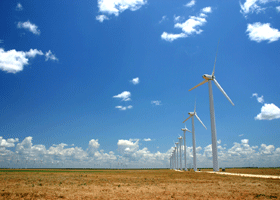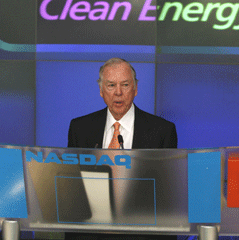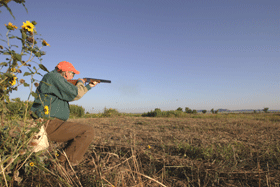Don't Mess with Texas Wind
Air Date: Week of June 6, 2008

A wind farm in Scurry County, West Texas. Pickens’ wind farm may be one of many wind farms in Texas, but with a 4,000 megawatt generating capacity, it’ll be the biggest. (Photo: Sarah Fields)
Eighty-year-old Texas oil billionaire T. Boone Pickens is feeling the green breeze – he’s putting 12 billion dollars into what will be the world’s largest wind farm. Pickens tells host Bruce Gellerman about the project that will power one million homes, and help with U.S. energy
Transcript
GELLERMAN: Well now from the halls of Congress where they’re debating energy proposals – to Texas, where energy is big business. And one of the biggest players in that business is T. Boone Pickens. The oil tycoon started out as a small time driller in the 1950’s and parlayed his stake in petroleum into an empire, turning him into one of the richest people on the planet. But now Pickens is turning away from oil – and into wind. This month he put down the first installment on a billion dollars worth of wind turbines. It’s part of his ambitious plan to turn 200 thousand acres of the Texas Panhandle into the world’s biggest wind generating power plant. Mr. Pickens, welcome to Living on Earth!
PICKENS: Good, thank you.
GELLERMAN: Mr. Pickens, you're a petroleum guy, right?
PICKENS: That's right.
GELLERMAN: So...why you pickin' up the green patina and going with, you know, wind energy?

T. Boone Pickens talks about his company Clean Energy at the Nasdaq. (Courtesy of T. Boone Pickens)
GELLERMAN: So how big is your project?
PICKENS: It's big. It's a uh, I think it's the largest wind farm in the world. It'll be 4000 megawatts, which will be about probably two pretty good nuclear plants. So, it'll service a million, three-hundred thousand homes, and it'll be about a 10 billion dollar project without the transmission, and we probably will do the transmission, and that’d be another two billion – so, total cost would be 12 billion dollars.
GELLERMAN: Now it's pretty unusual for somebody to bankroll the transmission lines.
PICKENS: It is. That is unusual, I agree.
GELLERMAN: Well, why don't you let somebody else pay for it, like the transmission people?
PICKENS: Well, it, everything goes slower if I do that. So to fit the schedule of when we're gonna be ready to start spinning, which will be the last of 2011, we need to have transmission in place at that time, and this is the only way we can time it to work that way. And, see, everything has gotta happen fast for me, because I'm 80 years old.
GELLERMAN: Now I'm sure you're aware that at the end of this year the federal wind energy production tax credits expire - Congress has not voted on them.
PICKENS: Well, that, I think they'll vote on it. They'll either do that or they'll give some kind of carbon credit because, the wind has to be developed in the United States. We're not importing 72 percent of the oil we use every day. I think everybody can see that we're gonna break the country if we pay 700 billion dollars a year for, uh, imported oil.

A wind farm in Scurry County, West Texas. Pickens’ wind farm may be one of many wind farms in Texas, but with a 4,000 megawatt generating capacity, it’ll be the biggest. (Photo: Sarah Fields)
PICKENS: That's it.
GELLERMAN: Hmm. But the president has been against this because he wants to use tax credits not for alternative energies like wind, but for, you know, petroleum, which you're also invested in.
PICKENS: Well, but the president won't be around, though, for very much longer.
GELLERMAN: Uh huh, so you're banking on another president taking—
PICKENS: Well, I'm banking on Congress passing the production tax credit, yes.
GELLERMAN: I know you're a big quail hunter, right?
PICKENS: I'm a quail hunter, yes.
GELLERMAN: What about your concern about birds getting caught in the blades of these turbines?
PICKENS: You know, do you know how high these things are? The hub on the turbine is 280 feet up, and then the radius on the blade is another 120 feet. So you're 280 plus 120 - you're 400 feet up on this to the tip - you know, that's a 40 story building. It would have nothing to do with quail, quail don't fly that high. But we're not in flyways, where you have, you know, migration through this area, so you don't have that many birds. I don't, I think you kill more birds on the window at my ranch house, and they do fly into the window, and I bet you kill more birds on the windows of buildings and houses and all than you ever would off the blades on those windmills.

T. Boone Pickens hunts for quail at his Mesa Vista Ranch in the Texas Panhandle. (Photo: Wyman Meinzer, Courtesy of T. Boone Pickens)
PICKENS: Keeps me up at night? I sleep. I'm not up at night. Well, I don't worry about things. I have, from time to time I have concerns about things, but not, I don't worry. And I don’t know, I mean what concerns me about it? I think we've got it well analyzed, I've got a good team of people that are knowledgeable in wind energy, and I don't worry about it. I think it's a good project, and it'll do well and we'll make money. And it'll help the country.
GELLERMAN: Mr. Pickens, I know you're a big basketball fan. I know you were once thinking about becoming a college coach. Who do you pick in the finals, Celtics or Lakers?
PICKENS: I pick Celtics.
GELLERMAN: Oh, good man! You're gonna put money on the game?
PICKENS: No, I don't bet on sports.
GELLERMAN: (laughs)
PICKENS: I've got a big enough bet on the wind.
GELLERMAN: Well, Mr. Pickens, thank you very much.
PICKENS: Good. I enjoyed the visit.
GELLERMAN: Texas wind tycoon, T Boone Pickens.
[MUSIC: Jimi Hendrix “The New Rising Sun” from ‘Voodoo Soup’ (MCA Records 1995)]
GELLERMAN: Coming up: turning greenbacks in to green bucks – investing in the next big thing. That’s straight ahead on Living on Earth.
Living on Earth wants to hear from you!
Living on Earth
62 Calef Highway, Suite 212
Lee, NH 03861
Telephone: 617-287-4121
E-mail: comments@loe.org
Newsletter [Click here]
Donate to Living on Earth!
Living on Earth is an independent media program and relies entirely on contributions from listeners and institutions supporting public service. Please donate now to preserve an independent environmental voice.
NewsletterLiving on Earth offers a weekly delivery of the show's rundown to your mailbox. Sign up for our newsletter today!
 Sailors For The Sea: Be the change you want to sea.
Sailors For The Sea: Be the change you want to sea.
 The Grantham Foundation for the Protection of the Environment: Committed to protecting and improving the health of the global environment.
The Grantham Foundation for the Protection of the Environment: Committed to protecting and improving the health of the global environment.
 Contribute to Living on Earth and receive, as our gift to you, an archival print of one of Mark Seth Lender's extraordinary wildlife photographs. Follow the link to see Mark's current collection of photographs.
Contribute to Living on Earth and receive, as our gift to you, an archival print of one of Mark Seth Lender's extraordinary wildlife photographs. Follow the link to see Mark's current collection of photographs.
 Buy a signed copy of Mark Seth Lender's book Smeagull the Seagull & support Living on Earth
Buy a signed copy of Mark Seth Lender's book Smeagull the Seagull & support Living on Earth

